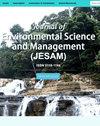Social, Economic and Environmental Impact ofElectric Vehicles in India
IF 0.3
4区 环境科学与生态学
Q4 ENVIRONMENTAL SCIENCES
引用次数: 1
Abstract
This study gives a general overview of the social, economic, and environmental impacts of electric vehicles (EVs) in India. The growing threats of global warming, excessive petrol dependence, ever increasing prices of fuel, and driving trends are just a selection of reasons which have accelerated the development of EV since the transport sector also represents a critical percentage of greenhouse gas emission. The aim of this study is to compare and analyze the development of the EV market and the government support in making the trend and accelerating it to save the nation and the world from pollution in India. Electric vehicles have huge potential from a user perspective. In the coming years, EVs will have a very important role in smart transportation and smart cities, along with shared mobility, mass transport, etc. Therefore, more efforts to facilitate the charging process and to improve batteries are needed. In a thrust towards incentivizing new age technologies and reducing its carbon emissions to net-zero by the year 2070, India is aggressively promoting the adoption of EVs. India aims to switch 30% of private cars, 70% of commercial vehicles, and 80%of two and three-wheelers to EVs by the year 2030. Increase percentage of renewable energy in the electricity mix and prevent air pollution caused from battery manufacturing. The recommended policies can be accepted by any market globally for reducing air pollution through increased adoption of electric vehicles. The environmental considerations of electric mobility challenges exist in terms of environmental impacts generated by the rising demand for electric vehicles.电动汽车在印度的社会、经济和环境影响
本研究概述了印度电动汽车对社会、经济和环境的影响。全球变暖的威胁日益严重,过度依赖汽油,燃料价格不断上涨,驾驶趋势只是加速电动汽车发展的原因之一,因为交通部门也代表了温室气体排放的关键百分比。本研究的目的是比较和分析印度电动汽车市场的发展和政府在推动和加速这一趋势以拯救国家和世界免受污染方面的支持。从用户的角度来看,电动汽车具有巨大的潜力。未来几年,电动汽车将在智能交通、智慧城市、共享出行、大众交通等领域发挥重要作用。因此,需要更多的努力来简化充电过程和改进电池。为了激励新时代技术,并在2070年之前将碳排放减少到净零,印度正在积极推动电动汽车的采用。印度的目标是到2030年将30%的私家车、70%的商用车和80%的两轮车和三轮车换成电动汽车。提高可再生能源在电力结构中的比例,防止电池制造造成的空气污染。建议的政策可以被全球任何市场所接受,通过增加电动汽车的采用来减少空气污染。电动交通挑战的环境考虑因素存在于对电动汽车需求不断增长所产生的环境影响方面。
本文章由计算机程序翻译,如有差异,请以英文原文为准。
求助全文
约1分钟内获得全文
求助全文
来源期刊

Journal of Environmental Science and Management
ENVIRONMENTAL SCIENCES-
CiteScore
0.90
自引率
0.00%
发文量
10
审稿时长
2 months
期刊介绍:
The Journal of Environmental Science and Management (JESAM) is an international scientific journal produced semi-annually by the University of the Philippines Los Baños (UPLB).
JESAM gives particular premium to manuscript submissions that employ integrated methods resulting to analyses that provide new insights in environmental science, particularly in the areas of:
environmental planning and management;
protected areas development, planning, and management;
community-based resources management;
environmental chemistry and toxicology;
environmental restoration;
social theory and environment; and
environmental security and management.
 求助内容:
求助内容: 应助结果提醒方式:
应助结果提醒方式:


